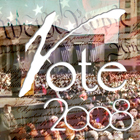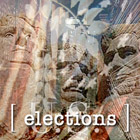
|
CALIFORNIA ELECTORAL COLLEGE PLAN MAY UNDERMINE NATIONAL ELECTION INTEGRITY CRITICS SAY PLAN DESIGNED TO GIVE GOP UNFAIR ADVANTAGE IN NATIONAL VOTE 30 August 2007 The Electoral College is a procedural peculiarity enshrined in the Constitution, initially intended to protect the voting power of slave-holding states, which puts the very concept of majority rule in question. A California plan to "reform" the system would grant electoral college votes to the Republican party even if it doesn't win the state, which would rob the Democrats of votes they would not gain in any state controlled by Republicans. A national popular vote initiative is under consideration in 47 states, and would form a new system where states agree to give their electors to the winner of the national popular vote. The Constitution empowers states to choose how members of the electoral college are chosen and how they vote. When states holding 270 electors collectively pass the plan into law, it will officially mean the winner of the popular vote will always be chosen by the Electoral College. In 2006, both houses of the California Congress passed legislation signing onto the plan, but Gov. Arnold Schwarzenegger, a Republican, vetoed the legislation. This set the stage for a very heated partisan debate, both in California and across the nation. A fundamental question of the dedication to democratic principles comes into play when one state sets up its legislative process as a means of engineering a sway in the national presidential vote. The Constitution provides for each state to determine how its electors will vote, in legislation to be laid out before the election is held. Article II, Section 1 reads "Each State shall appoint, in such Manner as the Legislature thereof may direct, a Number of Electors, equal to the whole Number of Senators and Representatives to which the State may be entitled in the Congress". Each state decides its own process for holding elections and names an election supervisor, often the Secretary of State for that state. Methods can vary widely, but the principle of the Electoral College remains that within the College, "The Person having the greatest Number of Votes shall be the President", as stated in the Constitution itself. For this reason, most states mandate that in their electoral process the "voter's intent" must be the primary principle governing the count of ballots cast. The national popular vote initiative is an effort by state governments to correct what is widely felt to be a legal anomaly, specifically attributable to the 18th-century climate in which the Constitution needed the support of states whose economies depended on slaveholding. As there is nothing about the American political process that still requires such troubling interest groups to hold extraordinary sway over the national vote, and the integrity of the Union does not depend on assuaging those who would go to war to tear the nation apart or undermine its democratic principles, a majority of states have proposed legislation to mandate that their electors support the national popular vote. In theory, California's refusal to do so, and its attempt to modify its own internal Electoral College processes, would not affect the national vote in any way, so long as a number of states aside from California whose electoral votes total at least 270 choose to hand 100% of their electors to the winner of the national popular vote. California's proposed plan to turn the clock back on the Electoral College would render the system still more opaque and open new terrain for manipulations across the country. It would be far more difficult to trace individual abuses to their effect on the overall vote, and the specific aim would be to take advantage of the Electoral College system to hand extra votes to one candidate. [s]
BACKGROUND: Among the early news emerging from the 2006 midterm elections: Hillary Clinton, Ted Kennedy win by wide margins; embattled Republican senator Rick Santorum is ousted by Bob Casey, Jr., by margin of nearly 59% to 41%; Rep. Weldon loses seat in PA, largely due to corruption scandal; Democrats take control of House of Representatives. [Full Story] SECURITY OF U.S. ELECTIONS, VOTING RIGHTS NOT GUARANTEED The 2000 election process gave clear evidence that the established system for running elections and counting votes in the United States is not cohesive, not fool-proof and not secure against tampering. Congress took action to reform voting standards nationwide to "Help America Vote". But that legislation suffered one fatal flaw: while promoting the shift to touchscreen ballots, it did not require that electronic balloting machines produce a paper record that could be hand-checked. [Full Story] TWENTY-SIX STATES HAVE PASSED LEGISLATION REQUIRING PAPER TRAILS FOR ELECTRONIC BALLOTS Since the 2000 election, voting technology has become a major issue in US elections regimens and regulations; touchscreen balloting machines, which legislatures seem to have favored as a way to record votes accurately, eliminating the 'hanging chad' problem, were designed with no paper record and have proven insecure and susceptible to tampering. Now, 26 US states have passed laws requiring paper trails, and 13 more, plus Washington, DC, have proposed laws "not yet enacted". [Full Story] SAN DIEGO COUNTY SENT VOTING MACHINES HOME WITH POLL WORKERS ON EVE OF ELECTION Reports have emerged that according to the San Diego registrar of voters, poll workers in San Diego county took tamper-susceptible Diebold voting machines home on the eve of the election. In some cases, poll workers may have had unsupervised access to the machines for a week or longer. [Full Story] TEXAS REDISTRICTING FOUND ILLEGAL BY JUSTICE LAWYERS, FINDINGS OVERRULED New documents show Justice Department lawyers unanimously found the Texas Congressional redistricting plan to be illegal. But that finding was overruled by top Justice officials and the staff involved in the research and analysis "were subjected to an unusual gag rule", this according to the Washington Post. [Full Story] |
||||||
|
|||||||









